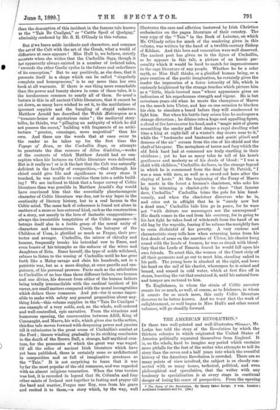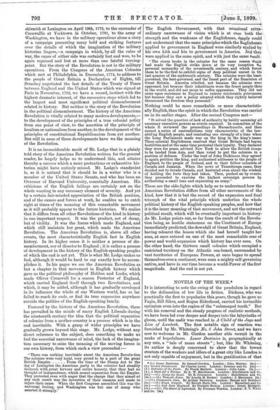THE AMERICAN REVOLUTION.* IN these two well-printed and well-illustrateu vGiunicq,
Mr. Lodge has told the story of the Revolution by which the thirteen colonies in which originated the United States of America politically separated themselves from England. It is, on the whole, hard to imagine any period which contains more pitfalls for the feet of the writer who attempts to tell its story than the seven and a half years into which the eventful history of the American Revolution is crowded. There are so many points of view involved, the subject is so closely con- nected with so many issues, technical, political, and even philosophical and speculative, that the writer with any tendency to specialisation is at every stage in continual danger of losing his sense of perspective. From the opening • The Story of the Revolution. By Henry Cabot Lodge. 2 vole. London ; Archibald Constable and Co. (3k.] skirmish at Lexington on April 19th, 1775, to the surrender of Cornwallis at Yorktown in October, 1781, to the army of Washington, we have in the military operations alone a stoiy of a campaign presenting many bold and striking features over the details of which the imagination of the military historian lingers,—a campaign in which, by all the rules of war, the cause of either side was certainly lost and won, to be again regained and lost at more than one fateful turning- point. But the story of the Revolution is not in the military operations. From the Congress of the American Colonies which met at Philadelphia in December, 1774, to address to the people of Great Britain a Declaration of Rights, till Strachey negotiated the last details of the Treaty of Peace between England and the United States which was signed at Paris in November, 1782, we have a record, instinct with the highest dramatic interest, of the successive steps which led to the largest and most significant political dismemberment related in history. But neither is the story of the Revolution in the political dismemberment. The history of the American Revolution is vitally related to many modern developments,— to the development of the principles of a true colonial policy from one point of view, to the assertion of the principle of localism or nationalism from another, to the development of the principles of constitutional Republicanism from yet another. But still in none of these developments have we the meaning of the Revolution.
It is no inconsiderable merit of Mr. Lodge that in a plainly told story of the American Revolution written for the general reader, he largely helps us to understand this, and attains thereby a success which a more pretentious or exhaustive his- torian might have entirely missed. Mr. Lodge's standpoint is, as it is natural that it should be in a writer who is a member of the United States Senate, and who has been an Overseer of Harvard University, essentially American. His criticisms of the English failings are certainly not on the whole wanting in any necessary element of severity. And yet by a certain fair-minded appreciation of the British position, and of the causes and forces at work, he enables us to catch sight at times of the meaning of this remarkable movement as it will probably appear to the future historian. We realise that it differs from all other Revolutions of the kind in history in one important respect. It was the product, not of decay, but of virility. It was the forces which made England, and which still maintain her great, which made the American Revolution. The American Revolution is, above all other events, the most characteristically English fact in English history. In its higher sense it is neither a process of dis- memberment, nor of disaster to England; is rather a process of development in the history of the Engish-speaking peoples of which the end is not yet. This is what Mr. Lodge makes us feel, although it would be hard to say exactly how he accom- plishes it. In his pages we see the American Revolution as but a chapter in that movement in English history which gave us the political philosophy of Hobbes and Locke, which made Oliver Cromwell for a season Protector of England, which carried England itself through two Revolutions, and which, it may be added, although it has gradually enveloped in its influence the whole of our Western world, has so far failed to reach its ends, or find its true expression anywhere outside the polities of the English-speaking family.
Fostered by the history of the American Revolution, there has prevailed in the minds of many English Liberals during the nineteenth century the idea that the political separation of colonies from a mother-country is a process which is in the end inevitable. With a grasp of wider principles we have gradually grown beyond this stage. Mr. Lodge, without any direct reference to the subject, does something to make us feel the essential narrowness of mind, the lack of the imagina- tion necessary to seize the meaning of the moving forces in our own history, from which such a view proceeded :- "There was nothing inevitable about the American Revolution The colonies were very loyal, very proud to be a part of the great British Empire. From the time of the Stamp Act to the day of Lexington the American party in the colonies had steadily declared, with great fervour and entire honesty, that they had no thought of independence, which meant separation from the Empire. They protested even with anger that the charge that they aimed at any such result was the invention of their enemies and made to injure their cause. When the first Congress assembled this was the universal feeling, and Washington was but one of many who asserted it strongly." The English Government, with that occasional extra-. ordinary narrowness of vision which is at once both the strength and the weakness of the Englishman, s1mply could not understand that the same principles which the Englishman applied to government in England were similarly a/Ailied .by his own kith and kin to government in America. Ald they were applied in the same spirit, and with just the same result : " The storm broke in the colonies for the same reason **jai had made the English strike down at its very inception tie personal monarchy of the seventeenth century, and which forces them to be the first to exhibit signs of deep political unrest in the last quarter of the eighteenth century. The colonies were the least- governed, the best-governed, and the freest part of the Dominion of Great Britain. America rebelled, not because the colonies were oppressed, but because their inhabitants were the freest people then in the world, and, did not mean to suffer oppression. They did not enter upon resistance to England to redress intolerable grievances. but because they saw a policy adopted which they rightly believed threatened the freedom they possessed."
Nothing could be more remarkable or more characteristic- ally English, than the spirit in which the Revolution was carried on in its earlier stages. After the second Congress met- " It solved the question of lack of authority by boldly assuming all necessary executive powers as events required. In committee of the whole it reviewed the proceedings in Massachusetts, and then ensued a series of contradictions very characteristic of the law- abiding English people, and reminding one strongly of a time when the Long Parliament made war on the king in the king's name. These colonial Englishmen resolved that Great Britain had begun hostilities and at the same time protested their loyalty. They declared they were for peace, advised New York to allow the British troops to be landed from Asia, and then voted to put the colonies in a position of defence. Under the lead of John Dickinson they agreed to again petition the king, and authorised addresses to the people of England, to the people of Ireland, and to their fellow colonists of Canada and Jamaica. When the news of Ticonderoga came, they decided not to invade Canada, and hesitated even about the wisdom of holding the forts they had taken. Then, pushed on by events, they proceeded to exercise the highest sovereign powers by authorising a small loan and organising an army."
These are the side-lights which help us to understand how the American Revolution differs from all other movements of the kind, how that it is but the record of the expansion and final triumph of the vital principle which underlies the whole political history of the English-speaking peoples, and how that it is the inner meaning of that movement, and not the outward political result, which will be eventually important in history. As Mr. Lodge points out, so far from the result of the Revolu- tion being, as hostile statesmen on the Continent of Europe immediately predicted, the downfall of Great Britain, England, having relearnt the lesson which she had herself taught her sons, at once entered on one of the most remarkable eras of power and world-expansion which history has ever seen. On the other hand, the thirteen small colonies which occupied a restricted territory on the Atlantic sea-board, surrounded by vast territories of European Powers, at once began to spread themselves over a continent, were soon a mighty self-governing nation, and have in our time become a world-Power of the first magnitude. And the end is not yet.







































 Previous page
Previous page